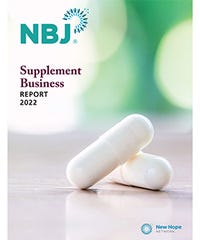
It is old news that the pandemic led to record growth of 14.5% for the supplement market in 2020—but Nutrition Business Journal's 2022 Supplement Business Report answers the key question of what comes next, looking at the market dynamics coming out of a record year of growth. The industry grew 7.5% in 2021, adding $4.16 billion in sales and coming in at more than $5 billion higher than 2019's pre-COVID projections.
Looking across sales categories, vitamins continue to be the largest single category with 31.2% of sales last year, but herbs and botanicals shine when it comes to growth. With the exception of 2020, when general health and immunity demand drove vitamin growth, herbs and botanicals has continued to have the highest category growth since 2014. This has led to a shift in market share, with the category on track to capture 22.0% of the market by 2025, up from just 18.6% in 2017, indicating a more mainstream market for herbs.
As far as trends across sales channels, it comes as no surprise that e-commerce is leading a huge shift in channel dynamics. While growth in the channel dipped from an incredible 87.3% in 2020, the 30.0% seen in 2021 was still more than four times total industry growth. With this growth trajectory, e-commerce market share in supplement sales is expected to set a record in 2024, surpassing natural and specialty or mass market retail—and coming sooner than previously forecasted given the pandemic-related acceleration.
While the total market growth of 7.5% seen last year is certainly a normalization of the market, it is a less dramatic drop than the 5.3% that NBJ previously projected, driven by extended effects of the COVID pandemic on consumer health purchases. The industry ended 2021 at nearly $60 billion in annual sales, up from just $43.42 billion five years ago—and it's expected to add nearly another $10 billion through 2025.
 For an in-depth dive into the supplements industry, check out the newly published Nutrition Business Journal Supplement Business Report 2022.
For an in-depth dive into the supplements industry, check out the newly published Nutrition Business Journal Supplement Business Report 2022.
About the Author
You May Also Like






